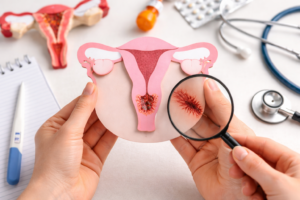Overview
Explore the causes, symptoms, and treatments of irregular periods. Expert insights from Ova Care to support your reproductive health journey.
Understanding Your Menstrual Cycle
At Ova Care, we recognize that women’s reproductive health is complex and unique. Irregular periods can be a source of confusion and concern, but they’re more common than you might think.
What Defines an Irregular Period?
A typical normal menstrual cycle ranges from 21 to 35 days. Irregular periods deviate from this pattern, potentially indicating various underlying health conditions or lifestyle factors.
Common Types of Menstrual Irregularities
Women might experience several types of menstrual challenges:
- Amenorrhea: Complete absence of periods
- Oligomenorrhea: Infrequent menstruation
- Dysmenorrhea: Painful periods
- Abnormal uterine bleeding: Unexpected bleeding patterns
Potential Underlying Causes

Medical Conditions
Several health issues can contribute to irregular periods:
- Endometriosis
- Pelvic inflammatory disease
- Primary ovarian insufficiency
- Hypothyroidism and thyroid disorders
- Bleeding disorders
- Uterine cancer or ovarian cancer
Lifestyle Factors
Unexpected changes can impact your menstrual cycle:
- Significant weight fluctuations
- Intense chemotherapy
- Breastfeeding
- High-stress environments
- Dramatic exercise routines
Diagnostic Approaches
Our comprehensive evaluation includes:
- Detailed medical history review
- Pelvic exam
- Pelvic ultrasound
- Endometrial biopsy
- Hysteroscopy
Treatment Options
Medication Strategies
- Birth control pills
- Hormone therapy
- Anticoagulant drugs
Surgical Interventions
When necessary, we might recommend:
- Endometrial ablation
- Myomectomy
- Uterine artery embolization
- Hysterectomy
When to Seek Professional Help
Consult your primary care provider if you experience:
- Periods lasting over seven days
- Bleeding after menopause
- Toxic shock syndrome symptoms
- Potential ectopic pregnancy signs
- Miscarriage concerns
Preventing Complications
Self-Care Strategies
- Maintain a balanced lifestyle
- Practice stress management
- Regular health screenings
- Proper IUD (intrauterine device) management
Your Reproductive Health Matters
At www.theovacare.com, we’re committed to supporting women through every stage of their reproductive journey.
Schedule a consultation today to understand your unique health needs.
Disclaimer: This information is for educational purposes and should not replace professional medical advice.










 No need to worry, your data is 100% Safe with us!
No need to worry, your data is 100% Safe with us!